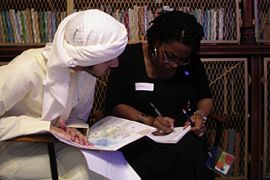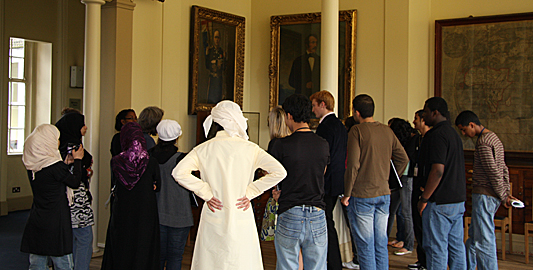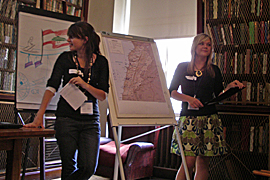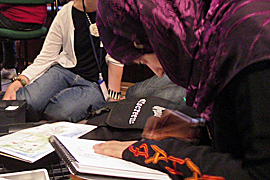Painting over Arab stereotypes
Teenage Arab artists visit the UK to create a picture of their lives.

 |
| Eight students and their teachers are spending two weeks meeting young Britons |
Eight students and their teachers from across the Arab world are on an artistic journey across Britain. They want to help British teenagers paint a fresh picture of life in the Middle East, as part of a project called Offscreen.
Think of the Arab world, and if you have grown in up rural England, you might be picturing a camel, men in tents, and war-ravaged cities.
Seventeen-year-old Becky Boyd from Essex, in south-east England, had never met anyone from Lebanon.
Now she has had the opportunity to spend the day working with two girls who have just flown in from Beirut.
“Before today, I had a really stereotypical view that it would be all desert and really hot, not developed at all, living in huts,” she says.
 |
| Offscreen began after four British students spent a year in the Middle East |
Offscreen started when four British artists spent a year travelling around the Middle East.
Their ideas of the region were turned on their head. Now they want to help other British students redraw their mental image.
A year ago, they took nine teenagers from east London to the Middle East and 20,000 British students and teachers followed their journey online.
Stephen Stapleton, Offscreen’s director, is sure this return trip will have a similar impact.
“If you do invest in those kids’ lives, they will have a ripple effect – with the technology, we can start to reach much bigger audiences,” he told Al Jazeera.
“It’s about the general fight for perceptions and for truth, which is where the internet comes in.”
Challenging perceptions
For Stapleton, it is about swapping a set of false stereotypes for a fresh collection of more accurate images. Literally, creating a new vision.
The Arab and British students spent the day asking about each other’s home towns, using art to tell stories, and making visual presentations on what they have learned.
 |
| The project is challenging stereotypical images of Britons and Arabs |
Eiman Zain Alabedin is a teacher from Oman travelling with the group.
She believes teenagers are the best people to pick up and spread the new reality.
“Adults have ideas which have been with them for many years, it can’t be changed easily, but for youth – they are like a sponge. They’re more open minded, they accept different points of view,” she said.
But the cultural crash-course is not just one way.
Offscreen is also trying to update the image of Britain in the Arab world.
Out go men in pinstripe suits, old buildings and superstar football players – and in comes a picture of a diverse, multi-cultural society.
Abir Awad, a sixteen-year-old painter from Lebanon, has been meeting British-Arabs, and she is surprised by what she has found.
“I knew a lot were here, but not that much, I thought they have their own community in some areas but not being part of society, normally,” she said.
“Because in Lebanon there are some foreigners, they have a specific area of their own and they don’t come out, so we thought the Arab people here, they are the same.”
Over their fortnight in the UK, the students will tour the country, talking, producing art and swapping stories with young people from a range of backgrounds.
The hope is that when the paint has dried and the children have said their goodbyes, a clearer picture of each other’s lives will start to spread across Britain and the Arab world.
For Boyd, that realisation has already started: “Just meeting these real people it’s broadened my horizons so much, opened my mind, just made me realise, you can’t just take everything at face value.”
Sakhr Al-Makhadhi is a London-based British-Yemeni journalist.
The views expressed by the author are not necessarily those of Al Jazeera.